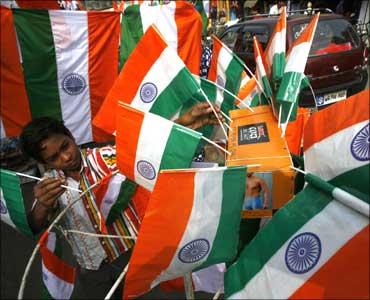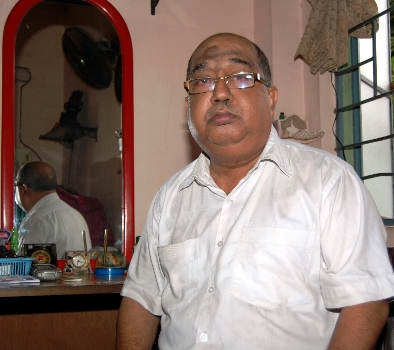
Though economic liberalisation in India can be traced back to the late 1970s, actual economic reforms began in right earnest only in July 1991.
At that time, the telecommunications services were a state monopoly and constituted a major bottleneck for conducting business.
So apathetic was the attitude of the government that when a Member of Parliament complained about poor telephone service in Delhi during the early 1980s, the then telecommunications minister went on to remind him that in a poor country like India, the telephone was a luxury.
The minister then added that if the member was unhappy with the service, he could return his phone since many customers had queued up for it for years!
Those days are well and truly over. In May 2010 alone, telecom operators in India added 16.3 million new subscribers in May this year and the wireless subscriber base touched 617.53 million. With this, the overall teledensity (telephones per 100 people) in India reached 55.38 per cent.
Progress has also been made in many areas that were previously off limits to reforms. Ever since economic liberalisation set in, India has been ushered in into a whole new world of change.
These reforms have paid handsomely. The economy has grown at more than 6 per cent for a long time, coupled with full macroeconomic stability. This compares with a growth rate of 3.5 per cent during 1950-1980.
However, as noted economist Arvind Panagariya writes in a paper on India's Economic Reforms, 'the accomplishments of the past decade are dwarfed only by what remains to be done. To begin with, the fiscal deficit is in a dire state. The combined deficit at the centre and states exceeds 10 per cent of gross domestic product. . . .this deficit is unsustainable; it is also crowding out private investment.'
So what does economic liberalisation mean to the common people? Are they happy with it or do they think an overt obsession with the issue has given birth to an unmanageable problem of inflation?
rediff.com spoke to a cross-section of the people from every walk of life to find out what the aam aadmi thinks of liberalisation. . . .

Sambhu Nag
Tax consultant
"The primary effect of globalisation as it started in 1991 was an unequal contest between the capital of indigenous companies and that of multi-national corporations. This was followed shortly by import liberalisation.
I feel the Bharatiya Janata Party-led National Democratic Alliance put too much stress on import liberalisation and, in a way, paved the road to its own downfall.
This problem, I think, was somewhat tackled well by the first phase of the Congress-led United Progressive Alliance government.
One has to accept that economic liberalisation did open a vistas that were hitherto unseen.
Sectors like telecommunication, information technology, banking, insurance went for a major overhaul overnight and the stock market started wearing a different altogether with newer and better investment avenues opening up.
In hindsight, however, liberalisation had its ill effects as well -- it gave birth to outsourcing, unbridled inflation, exploitation of the workforce, lesser job security, an overtly active media, easy accessibility to arms and ammunition, etc.
The government of India recently hiked the prices of petro products. Hence, fear of further rise in prices of essential commodities looms large.
It is time the Indian government took some prompt and concrete measures to ease the burden of inflation.
The finance ministry has to take into account the mounting overhead costs of oil companies that never let the oil prices come down. With able economists like Prime Minister Dr Manmohan Singh and Finance Minister Pranab Mukherjee at the helm, I don't see any reason why something cannot be done.
Also, apart from opening the markets, globalisation brought in a new realm of social, cultural and moral values. Indian society became more westernised, it started acquiring a new character.
To guard us against the ills of liberalisation, we Indians need to go in for thorough introspection. We need to reinvent our Indianness. A cultural revolution happens to be the need of the hour.
. . .

Anuradha Goswami, principal
East West Model School, Burdwan, (also former HOD, Bio Science, South Point High School)
I think economic liberalisation is one of the best things that ever happened to India in the last couple of decades.
The economy of India got fresh momentun, thanks to the steps taken by Dr Manmohan Singh as the finance minister in the early 1990s.
If we say India did not need it (liberalisation), we would be talking like the frog in the well. India would have never attained the heights it has attained now if liberalisation had not taken place.
Take the case of telecom revolution, for instance. Telecommunication has simply done wonders and it has lierally transformed the world into a global village.
I generally go abroad at least once a year leaving behind loads of household responsibilities. However, my mobile phone acts as my saviour as it keeps me connected the whole time.
Also, arrival of foreign goods and brands in India ushered in a healthy competition and quality of Indian-made goods improved a lot, or so I feel.
Same theory is applicable to the automobile industry as well. Who could have thought of seeing a Jaguar or a Land Rover on Indian roads 30 years back?
Having said this, I must also admit that price rise often happens to be the direct consequence of an open economy. Inflation has been a vexing issue ever since the United Progressive Aliance government came into power the second time.
And I must admit that it has not been able to do anything to contain the prices.
An open economy is a blessing no doubt but unbridled price rise is a curse. And it is the onus of the central government to take some concrete steps so that the poor and marginalised population of this country is not forced to starve.
. . .

Mousumi Sarkar
Teacher
Globalisation is synonymous with the advance of capitalism or a new form of imperialism. Globalisation has been a boon for some lucky people who have some links with the IT industry, but it has been a curse for others.
The Indian economy had experienced major policy changes in early 1990s. The new economic reforms aimed at making the Indian economy one of the fastest growing economies and globally competitive.
One of the fundamental principles of globalisation was a world without boundaries, nations sans seams. The market economy that evolved, however, seemed to be only concerned with the growth of consumerism to attract the high income groups that mostly reside in the cities.
Growth, therefore, got concentrated in some select sectors like information technology, finance, entertainment, telecommunications, travel and hospitality services, real estate and trade rather than in not-so-glamorous ones like agriculture and core industry.
Ironically, however, the last two provide livelihoods to the maximum number of of people in India, to whom World Trade Organization talks are of little or no significance at all.
To them, globalisation stands for increased petrol prices, availability of global brands in shopping malls, enhanced mobile phone connectivity, etc. This implied low international transportation costs which, in turn, allowed nations to trade with each other at a cost advantage.
The gradual increase in oil price disrupted this pillar of globalisation as it led to a rise in the price of finished goods.
Viewed from the Indian context, economic reform policies were initiated as a response to the crisis that erupted from the deep-rooted inequalities in the Indian society.
But instead of countering that, globalisation actually aggravated the situation by increasing the income and quality of consumption of only the high income groups.
It's a sad state of affairs.
. . .

Subrata Adhikari
Advocate
I think what our government sells in the name of economic liberalisation is nothing but an eyewash. If you ask me it is but economic aggression and business tactics by countries like the United States of America, the United Kingdom, France, etc.
Under the gimmick of globalistion, the US and some European countries have come to dominate the economy of India as well as that of other developing countries.
Some may argue that economic liberalisation means availability of foreign goods in India. But who gets to buy them, may I ask? Only the affluent class, of course. And let's not forget the latter is just a minority in a country like India.
It is rightly said that people get the government they deserve. The fault lies in us -- we have always had the tendency of making a non-issue an issue.
We tom-tom so much about open economy and Dr Manmohan Singh's visionary policies. Why don't we criticise the prime minister and his Cabinet for the insurmountable inflation. I think either these politicians are inefficient or they deliberately ignore the people's cause.
Perhaps, a direct corollary of the open economy -- at least the way it is practised in India -- is that the rich should get richer and the poor poorer.
. . .

Bhaskar Chakraborty
IT executive, Tata Consultancy Services
Globalisation means that the government tries to do less in the world of business and allows citizens to own their own factories and businesses.
Liberalisation, privatisation and globalisation that started in the early 1990s did a world of good to India. It contributed a competitive market to the Indian economy, made its consumers aware and conscious of their rights, helped improve the quality of Indian products and opened up a plethora of opportunities for Indian investors.
Sectors like telecommunication, insurance, banking, imports and exports went through a sea change and India entered a new era of economic revolution.
I still remember while we were in college, we never got to buy foreign brands. Thanks to the reforms designed by then Finance Minister Dr Manmohan Singh, Indian markest were flooded by foreign goods and youths like us could buy a pair of Reebok shoes or a Puma T-shirt.
But then it should be kept in mind that India is for every Indian and the government must keep in mind the interest of every citizen. A country where majority of the population is poor, the ruling coalition must think of ways to curtail the spiralling prices, a direct offshoot of liberalisation.
Take the case of recent hike in petro prices, for instance. It was one of the most irresponsible moves in recent times. And what is astonishing is that the same Dr Singh, fondly termed the architect of modern Indian economy, is adorning the prime minister's chair.
. . .

There is no denying the fact that we, the consumers, enjoy the benefits of the globally accepted liberalisation, privatisation, globalisation policy by countries to the hilt.
Thanks to globalisation, the manufacturers' market gradually got transformed into consumer market over the years.
Yesterday's world offered limited choices to consumers in comparison to the new liberalised era.
Trade, national and international, now largely depends on comparative advantage of its natural resources.
Need for socio-politico-economic regeneration and moderate market operation across the countries results in impregnation of globalisation through liberal imports and exports' policies.
Privatisation leads to healthy competition in prices and, at times, even achieve near-perfect competition.
Globalisation empowered the consumers to a large extent and they started dictating terms. New age benefits like cashless purchase, free-of-charge home delivery, hire purchase, gifts, etc poured in from every corner.
Consumers started understanding value for money better. However, globalisation also brought in a few ills.
As the market situation became somewhat complicated, problems like fraud, lack of proper consumer protection popped up.
Our government, thereafter created consumer protection cells to counter these problems.
However, at a glance, the positive effects of liberalisation far outnumber the negative effects and the Indian economy will continue to flourish, thanks to globalisation.
However, the onus rests on the Indian government now to help its people lead better lives.
It needs to take some measures whereby opportunities for employment will rise, more industries will come up, essential prices will operate within a certain level so that they do not go out of bounds. Price devaluation too needs to be stopped.
Steps must be taken to control inflation as a whole and business process outsourcing units must be provided legal recognition.